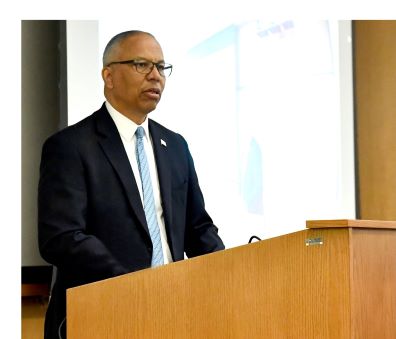Lt. Gov. Boyd Rutherford wraps up UMES’ ’20-21 social justice series
Friday, May 7, 2021

Boyd K. Rutherford challenged a UMES audience to be pro-active in shaping the future of the nation’s democracy. His remarks were delivered as part of the university’s social justice symposium.
“We need more people to be civically engaged,” Maryland’s lieutenant governor said, adding, “You don’t need to be a crank” to be heard.
In a broad-ranging, hour-long talk April 29 on “The Future of Democracy,” Rutherford pointed out the cyclical nature of political and social turmoil the nation has endured since its founding.
If pundits are troubled about the current direction of the country — especially in the aftermath of the Jan. 6 insurrection at the Capitol — Rutherford is less so. Yet, from his front-row seat as a Black Republican serving in the executive branch of a state that tends to lean Democratic at the ballot box, he does see challenges.
Schools, he said, should rethink how they present “basic civics” education and place more value on teaching that subject across primary and secondary levels. He even suggested colleges and universities would be wise to do the same — at least for freshmen.
Rutherford said today’s political turmoil underscores the guiding principle of the framers of the U.S. Constitution, who strove to “form a more perfect union.”
“We’re a representative democracy and a constitutional republic,” he said. “We have a set of rules in place set out by the constitution,” which he noted “is a guard rail to protect … minorities.”
Well-informed citizens, Rutherford said, have to work harder to discern fact from fiction because of the cataclysmic shift in the way information is disseminated.
In their heyday a century ago, he noted, the political bent of newspapers as the dominant source of current events was well known to readers.
“There’s a bias in a lot of media (today) that’s undisclosed,” Rutherford said.
Social media, in particular, plays an oversized, sometimes distorted role.
“It can rev up crowds … rabble rousers, which can lead to a situation like what we had on Jan. 6” in Washington, he said. “Information flows so quickly without being checked (and) it causes these challenges.”
“How do we overcome these challenges with division and angry rhetoric and how do we address that?” he asked.
“Make sure you are civically engaged,” Rutherford said, “particularly you students … you are going to be (the) people of influence.”
It is informed citizens’ responsibility “to make sure when bad speech or inaccurate speech” emerges to counter it “with facts.”
And don’t be reluctant to “push back on your own viewpoints” as well, he said.
“You need to understand where to go, and help other people understand where they need to go to get redress,” Rutherford said. “Participate at all levels … that’s what I hope you all will do as you continue with your lives.”

